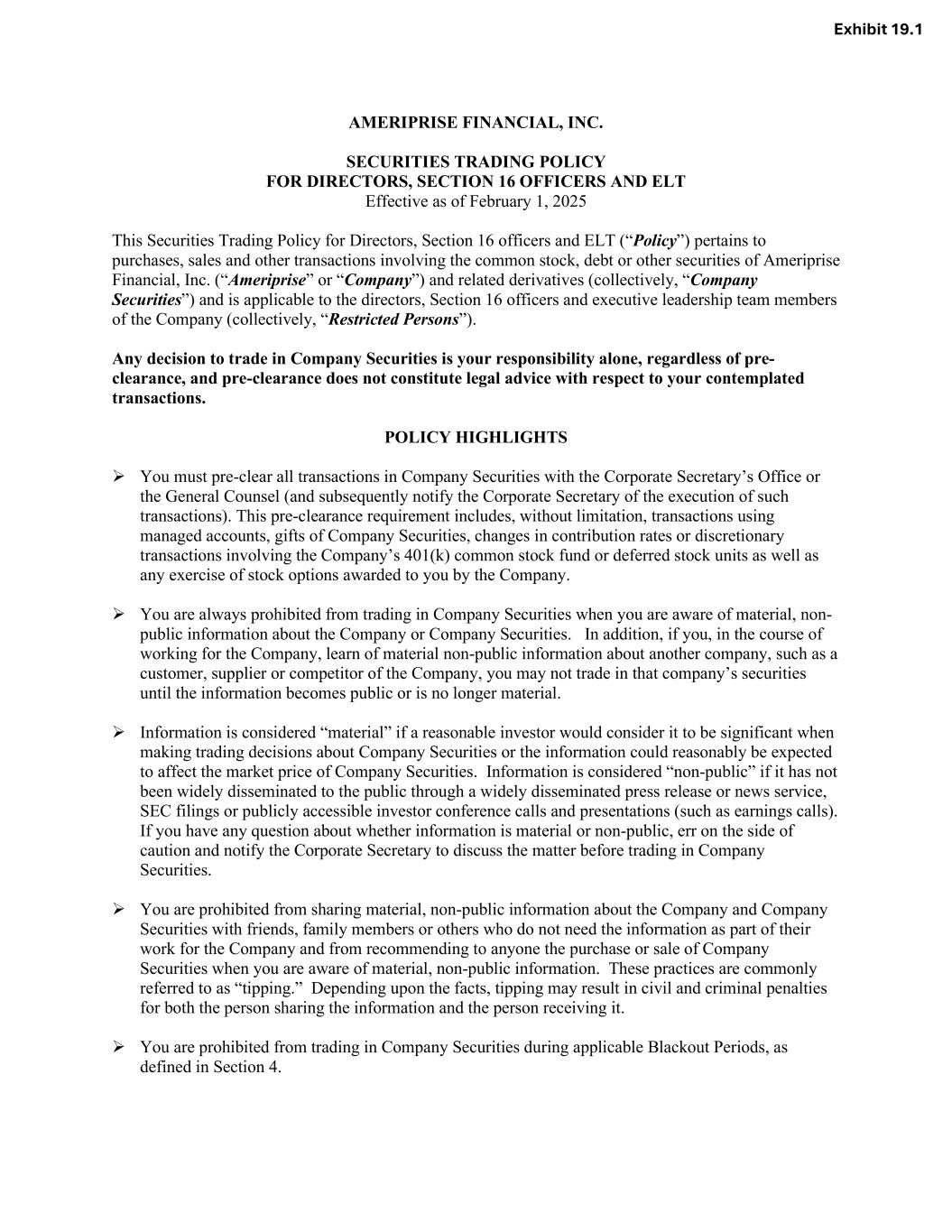
AMERIPRISE FINANCIAL, INC. SECURITIES TRADING POLICY FOR DIRECTORS, SECTION 16 OFFICERS AND ELT Effective as of February 1, 2025 This Securities Trading Policy for Directors, Section 16 officers and ELT (“Policy”) pertains to purchases, sales and other transactions involving the common stock, debt or other securities of Ameriprise Financial, Inc. (“Ameriprise” or “Company”) and related derivatives (collectively, “Company Securities”) and is applicable to the directors, Section 16 officers and executive leadership team members of the Company (collectively, “Restricted Persons”). Any decision to trade in Company Securities is your responsibility alone, regardless of pre- clearance, and pre-clearance does not constitute legal advice with respect to your contemplated transactions. POLICY HIGHLIGHTS You must pre-clear all transactions in Company Securities with the Corporate Secretary’s Office or the General Counsel (and subsequently notify the Corporate Secretary of the execution of such transactions). This pre-clearance requirement includes, without limitation, transactions using managed accounts, gifts of Company Securities, changes in contribution rates or discretionary transactions involving the Company’s 401(k) common stock fund or deferred stock units as well as any exercise of stock options awarded to you by the Company. You are always prohibited from trading in Company Securities when you are aware of material, non- public information about the Company or Company Securities. In addition, if you, in the course of working for the Company, learn of material non-public information about another company, such as a customer, supplier or competitor of the Company, you may not trade in that company’s securities until the information becomes public or is no longer material. Information is considered “material” if a reasonable investor would consider it to be significant when making trading decisions about Company Securities or the information could reasonably be expected to affect the market price of Company Securities. Information is considered “non-public” if it has not been widely disseminated to the public through a widely disseminated press release or news service, SEC filings or publicly accessible investor conference calls and presentations (such as earnings calls). If you have any question about whether information is material or non-public, err on the side of caution and notify the Corporate Secretary to discuss the matter before trading in Company Securities. You are prohibited from sharing material, non-public information about the Company and Company Securities with friends, family members or others who do not need the information as part of their work for the Company and from recommending to anyone the purchase or sale of Company Securities when you are aware of material, non-public information. These practices are commonly referred to as “tipping.” Depending upon the facts, tipping may result in civil and criminal penalties for both the person sharing the information and the person receiving it. You are prohibited from trading in Company Securities during applicable Blackout Periods, as defined in Section 4. Exhibit 19.1
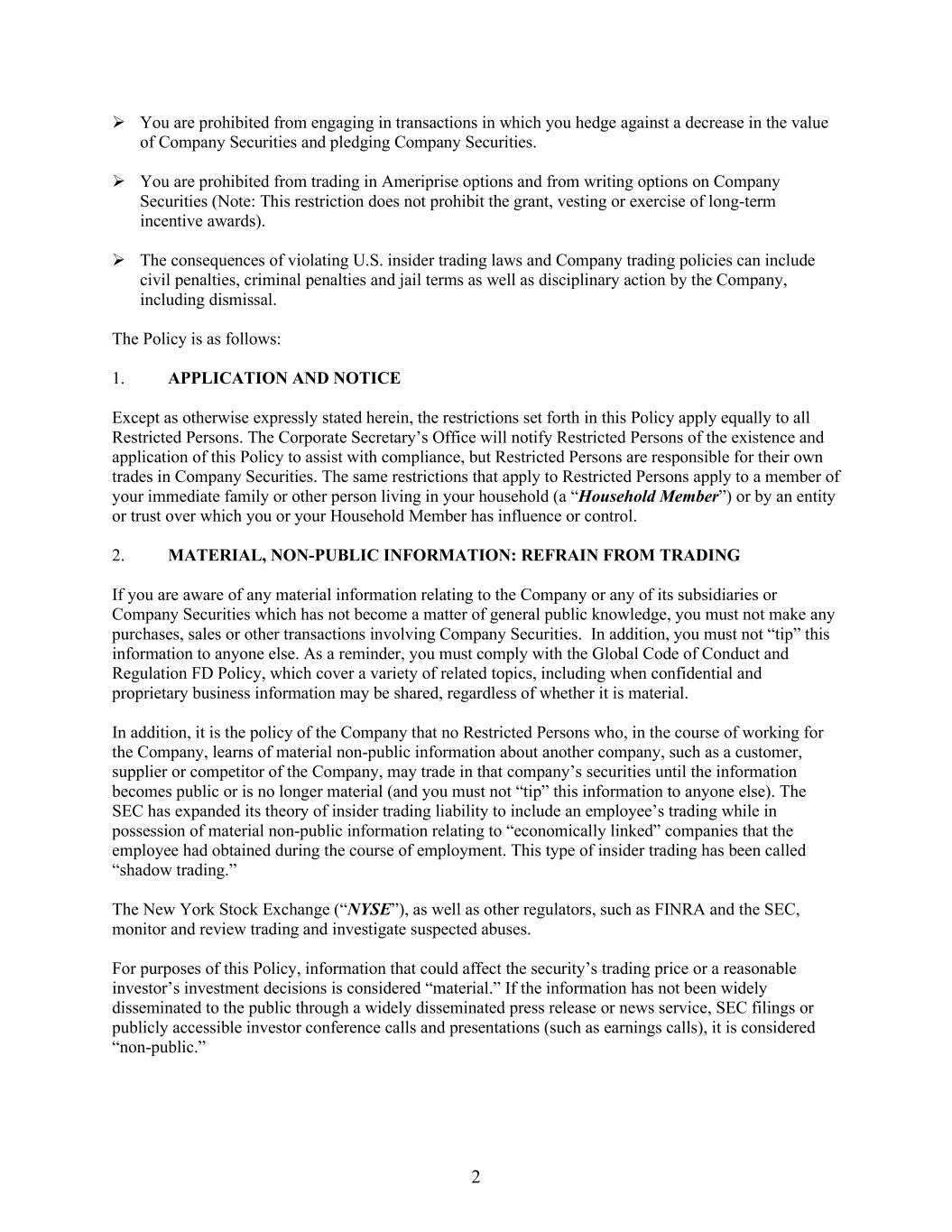
2 You are prohibited from engaging in transactions in which you hedge against a decrease in the value of Company Securities and pledging Company Securities. You are prohibited from trading in Ameriprise options and from writing options on Company Securities (Note: This restriction does not prohibit the grant, vesting or exercise of long-term incentive awards). The consequences of violating U.S. insider trading laws and Company trading policies can include civil penalties, criminal penalties and jail terms as well as disciplinary action by the Company, including dismissal. The Policy is as follows: 1. APPLICATION AND NOTICE Except as otherwise expressly stated herein, the restrictions set forth in this Policy apply equally to all Restricted Persons. The Corporate Secretary’s Office will notify Restricted Persons of the existence and application of this Policy to assist with compliance, but Restricted Persons are responsible for their own trades in Company Securities. The same restrictions that apply to Restricted Persons apply to a member of your immediate family or other person living in your household (a “Household Member”) or by an entity or trust over which you or your Household Member has influence or control. 2. MATERIAL, NON-PUBLIC INFORMATION: REFRAIN FROM TRADING If you are aware of any material information relating to the Company or any of its subsidiaries or Company Securities which has not become a matter of general public knowledge, you must not make any purchases, sales or other transactions involving Company Securities. In addition, you must not “tip” this information to anyone else. As a reminder, you must comply with the Global Code of Conduct and Regulation FD Policy, which cover a variety of related topics, including when confidential and proprietary business information may be shared, regardless of whether it is material. In addition, it is the policy of the Company that no Restricted Persons who, in the course of working for the Company, learns of material non-public information about another company, such as a customer, supplier or competitor of the Company, may trade in that company’s securities until the information becomes public or is no longer material (and you must not “tip” this information to anyone else). The SEC has expanded its theory of insider trading liability to include an employee’s trading while in possession of material non-public information relating to “economically linked” companies that the employee had obtained during the course of employment. This type of insider trading has been called “shadow trading.” The New York Stock Exchange (“NYSE”), as well as other regulators, such as FINRA and the SEC, monitor and review trading and investigate suspected abuses. For purposes of this Policy, information that could affect the security’s trading price or a reasonable investor’s investment decisions is considered “material.” If the information has not been widely disseminated to the public through a widely disseminated press release or news service, SEC filings or publicly accessible investor conference calls and presentations (such as earnings calls), it is considered “non-public.”
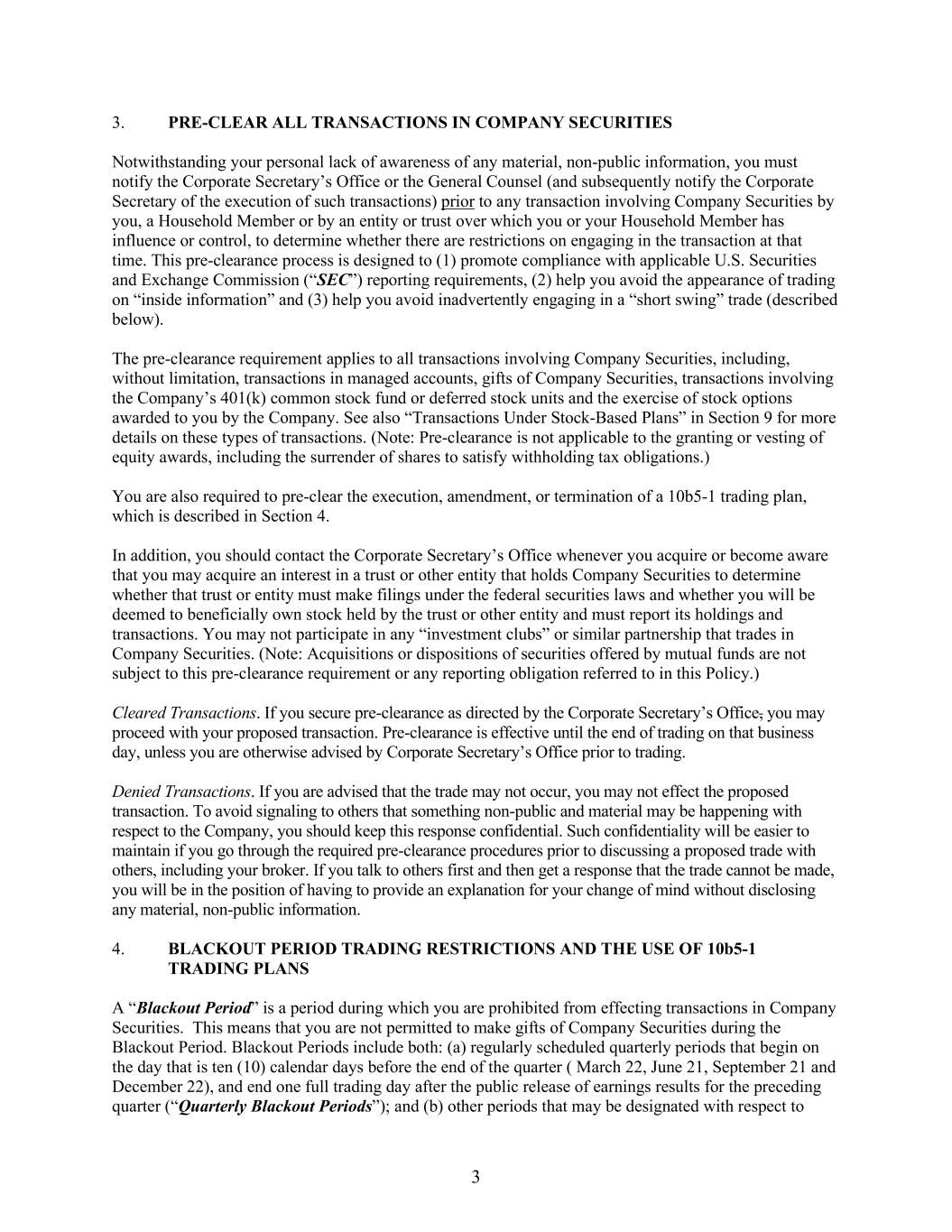
3 3. PRE-CLEAR ALL TRANSACTIONS IN COMPANY SECURITIES Notwithstanding your personal lack of awareness of any material, non-public information, you must notify the Corporate Secretary’s Office or the General Counsel (and subsequently notify the Corporate Secretary of the execution of such transactions) prior to any transaction involving Company Securities by you, a Household Member or by an entity or trust over which you or your Household Member has influence or control, to determine whether there are restrictions on engaging in the transaction at that time. This pre-clearance process is designed to (1) promote compliance with applicable U.S. Securities and Exchange Commission (“SEC”) reporting requirements, (2) help you avoid the appearance of trading on “inside information” and (3) help you avoid inadvertently engaging in a “short swing” trade (described below). The pre-clearance requirement applies to all transactions involving Company Securities, including, without limitation, transactions in managed accounts, gifts of Company Securities, transactions involving the Company’s 401(k) common stock fund or deferred stock units and the exercise of stock options awarded to you by the Company. See also “Transactions Under Stock-Based Plans” in Section 9 for more details on these types of transactions. (Note: Pre-clearance is not applicable to the granting or vesting of equity awards, including the surrender of shares to satisfy withholding tax obligations.) You are also required to pre-clear the execution, amendment, or termination of a 10b5-1 trading plan, which is described in Section 4. In addition, you should contact the Corporate Secretary’s Office whenever you acquire or become aware that you may acquire an interest in a trust or other entity that holds Company Securities to determine whether that trust or entity must make filings under the federal securities laws and whether you will be deemed to beneficially own stock held by the trust or other entity and must report its holdings and transactions. You may not participate in any “investment clubs” or similar partnership that trades in Company Securities. (Note: Acquisitions or dispositions of securities offered by mutual funds are not subject to this pre-clearance requirement or any reporting obligation referred to in this Policy.) Cleared Transactions. If you secure pre-clearance as directed by the Corporate Secretary’s Office, you may proceed with your proposed transaction. Pre-clearance is effective until the end of trading on that business day, unless you are otherwise advised by Corporate Secretary’s Office prior to trading. Denied Transactions. If you are advised that the trade may not occur, you may not effect the proposed transaction. To avoid signaling to others that something non-public and material may be happening with respect to the Company, you should keep this response confidential. Such confidentiality will be easier to maintain if you go through the required pre-clearance procedures prior to discussing a proposed trade with others, including your broker. If you talk to others first and then get a response that the trade cannot be made, you will be in the position of having to provide an explanation for your change of mind without disclosing any material, non-public information. 4. BLACKOUT PERIOD TRADING RESTRICTIONS AND THE USE OF 10b5-1 TRADING PLANS A “Blackout Period” is a period during which you are prohibited from effecting transactions in Company Securities. This means that you are not permitted to make gifts of Company Securities during the Blackout Period. Blackout Periods include both: (a) regularly scheduled quarterly periods that begin on the day that is ten (10) calendar days before the end of the quarter ( March 22, June 21, September 21 and December 22), and end one full trading day after the public release of earnings results for the preceding quarter (“Quarterly Blackout Periods”); and (b) other periods that may be designated with respect to
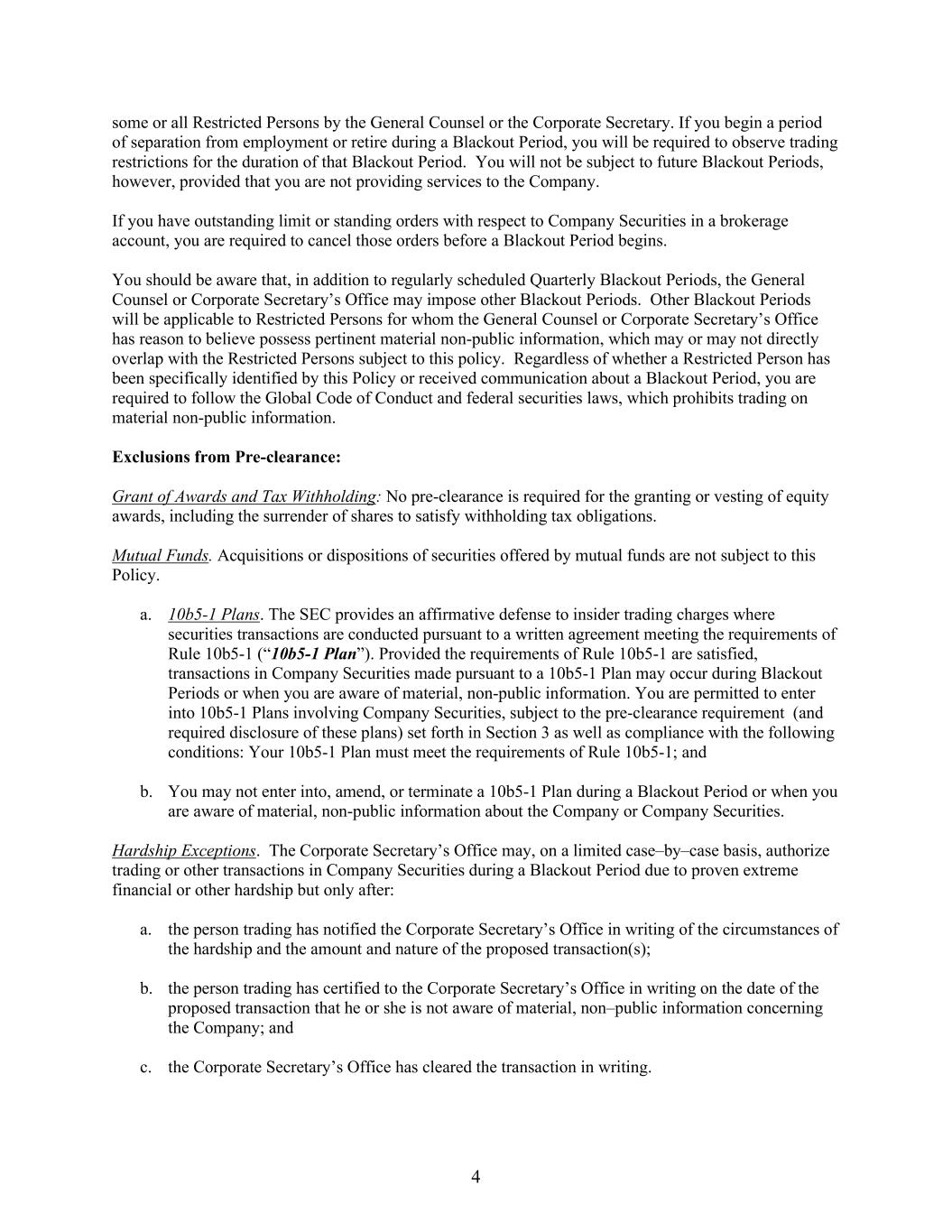
4 some or all Restricted Persons by the General Counsel or the Corporate Secretary. If you begin a period of separation from employment or retire during a Blackout Period, you will be required to observe trading restrictions for the duration of that Blackout Period. You will not be subject to future Blackout Periods, however, provided that you are not providing services to the Company. If you have outstanding limit or standing orders with respect to Company Securities in a brokerage account, you are required to cancel those orders before a Blackout Period begins. You should be aware that, in addition to regularly scheduled Quarterly Blackout Periods, the General Counsel or Corporate Secretary’s Office may impose other Blackout Periods. Other Blackout Periods will be applicable to Restricted Persons for whom the General Counsel or Corporate Secretary’s Office has reason to believe possess pertinent material non-public information, which may or may not directly overlap with the Restricted Persons subject to this policy. Regardless of whether a Restricted Person has been specifically identified by this Policy or received communication about a Blackout Period, you are required to follow the Global Code of Conduct and federal securities laws, which prohibits trading on material non-public information. Exclusions from Pre-clearance: Grant of Awards and Tax Withholding: No pre-clearance is required for the granting or vesting of equity awards, including the surrender of shares to satisfy withholding tax obligations. Mutual Funds. Acquisitions or dispositions of securities offered by mutual funds are not subject to this Policy. a. 10b5-1 Plans. The SEC provides an affirmative defense to insider trading charges where securities transactions are conducted pursuant to a written agreement meeting the requirements of Rule 10b5-1 (“10b5-1 Plan”). Provided the requirements of Rule 10b5-1 are satisfied, transactions in Company Securities made pursuant to a 10b5-1 Plan may occur during Blackout Periods or when you are aware of material, non-public information. You are permitted to enter into 10b5-1 Plans involving Company Securities, subject to the pre-clearance requirement (and required disclosure of these plans) set forth in Section 3 as well as compliance with the following conditions: Your 10b5-1 Plan must meet the requirements of Rule 10b5-1; and b. You may not enter into, amend, or terminate a 10b5-1 Plan during a Blackout Period or when you are aware of material, non-public information about the Company or Company Securities. Hardship Exceptions. The Corporate Secretary’s Office may, on a limited case–by–case basis, authorize trading or other transactions in Company Securities during a Blackout Period due to proven extreme financial or other hardship but only after: a. the person trading has notified the Corporate Secretary’s Office in writing of the circumstances of the hardship and the amount and nature of the proposed transaction(s); b. the person trading has certified to the Corporate Secretary’s Office in writing on the date of the proposed transaction that he or she is not aware of material, non–public information concerning the Company; and c. the Corporate Secretary’s Office has cleared the transaction in writing.
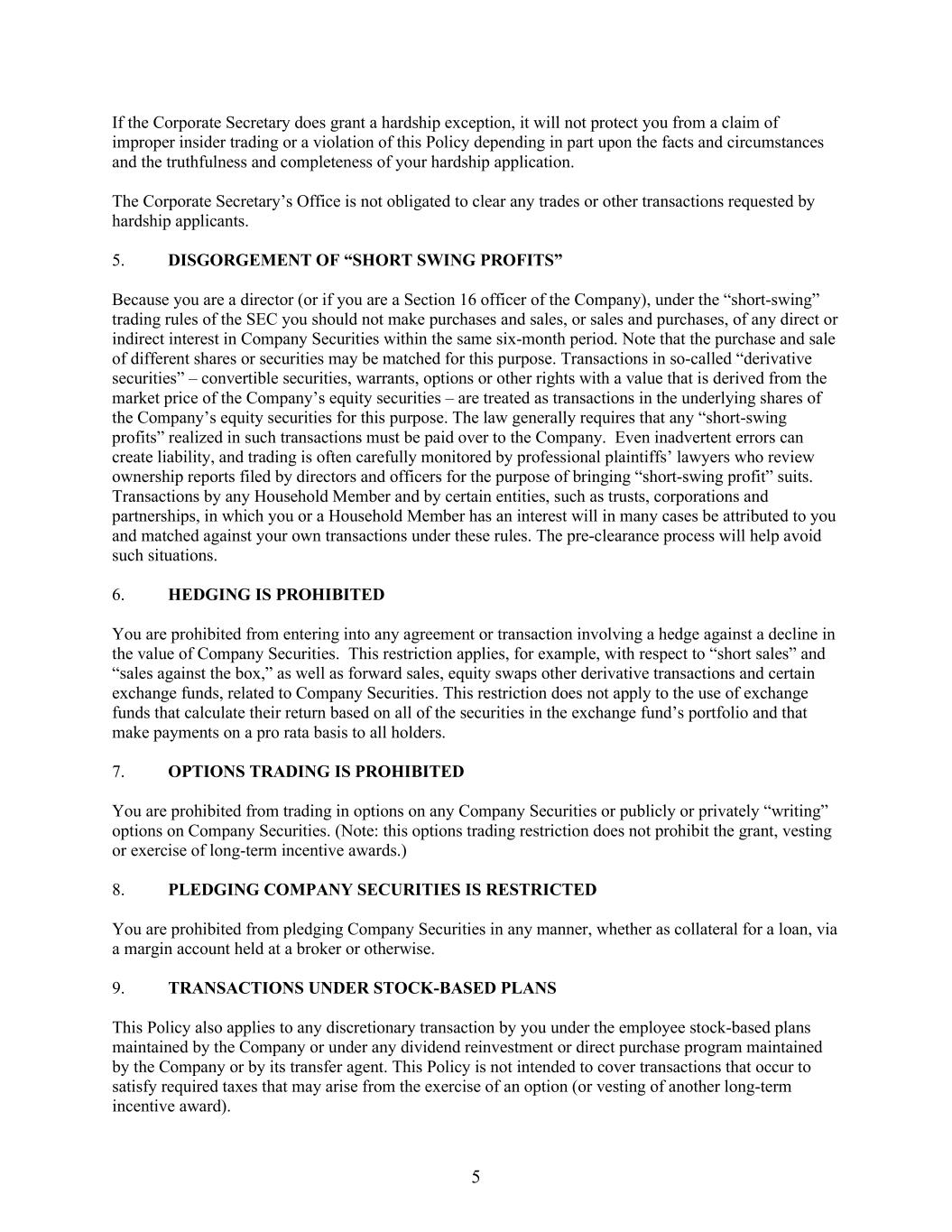
5 If the Corporate Secretary does grant a hardship exception, it will not protect you from a claim of improper insider trading or a violation of this Policy depending in part upon the facts and circumstances and the truthfulness and completeness of your hardship application. The Corporate Secretary’s Office is not obligated to clear any trades or other transactions requested by hardship applicants. 5. DISGORGEMENT OF “SHORT SWING PROFITS” Because you are a director (or if you are a Section 16 officer of the Company), under the “short-swing” trading rules of the SEC you should not make purchases and sales, or sales and purchases, of any direct or indirect interest in Company Securities within the same six-month period. Note that the purchase and sale of different shares or securities may be matched for this purpose. Transactions in so-called “derivative securities” – convertible securities, warrants, options or other rights with a value that is derived from the market price of the Company’s equity securities – are treated as transactions in the underlying shares of the Company’s equity securities for this purpose. The law generally requires that any “short-swing profits” realized in such transactions must be paid over to the Company. Even inadvertent errors can create liability, and trading is often carefully monitored by professional plaintiffs’ lawyers who review ownership reports filed by directors and officers for the purpose of bringing “short-swing profit” suits. Transactions by any Household Member and by certain entities, such as trusts, corporations and partnerships, in which you or a Household Member has an interest will in many cases be attributed to you and matched against your own transactions under these rules. The pre-clearance process will help avoid such situations. 6. HEDGING IS PROHIBITED You are prohibited from entering into any agreement or transaction involving a hedge against a decline in the value of Company Securities. This restriction applies, for example, with respect to “short sales” and “sales against the box,” as well as forward sales, equity swaps other derivative transactions and certain exchange funds, related to Company Securities. This restriction does not apply to the use of exchange funds that calculate their return based on all of the securities in the exchange fund’s portfolio and that make payments on a pro rata basis to all holders. 7. OPTIONS TRADING IS PROHIBITED You are prohibited from trading in options on any Company Securities or publicly or privately “writing” options on Company Securities. (Note: this options trading restriction does not prohibit the grant, vesting or exercise of long-term incentive awards.) 8. PLEDGING COMPANY SECURITIES IS RESTRICTED You are prohibited from pledging Company Securities in any manner, whether as collateral for a loan, via a margin account held at a broker or otherwise. 9. TRANSACTIONS UNDER STOCK-BASED PLANS This Policy also applies to any discretionary transaction by you under the employee stock-based plans maintained by the Company or under any dividend reinvestment or direct purchase program maintained by the Company or by its transfer agent. This Policy is not intended to cover transactions that occur to satisfy required taxes that may arise from the exercise of an option (or vesting of another long-term incentive award).
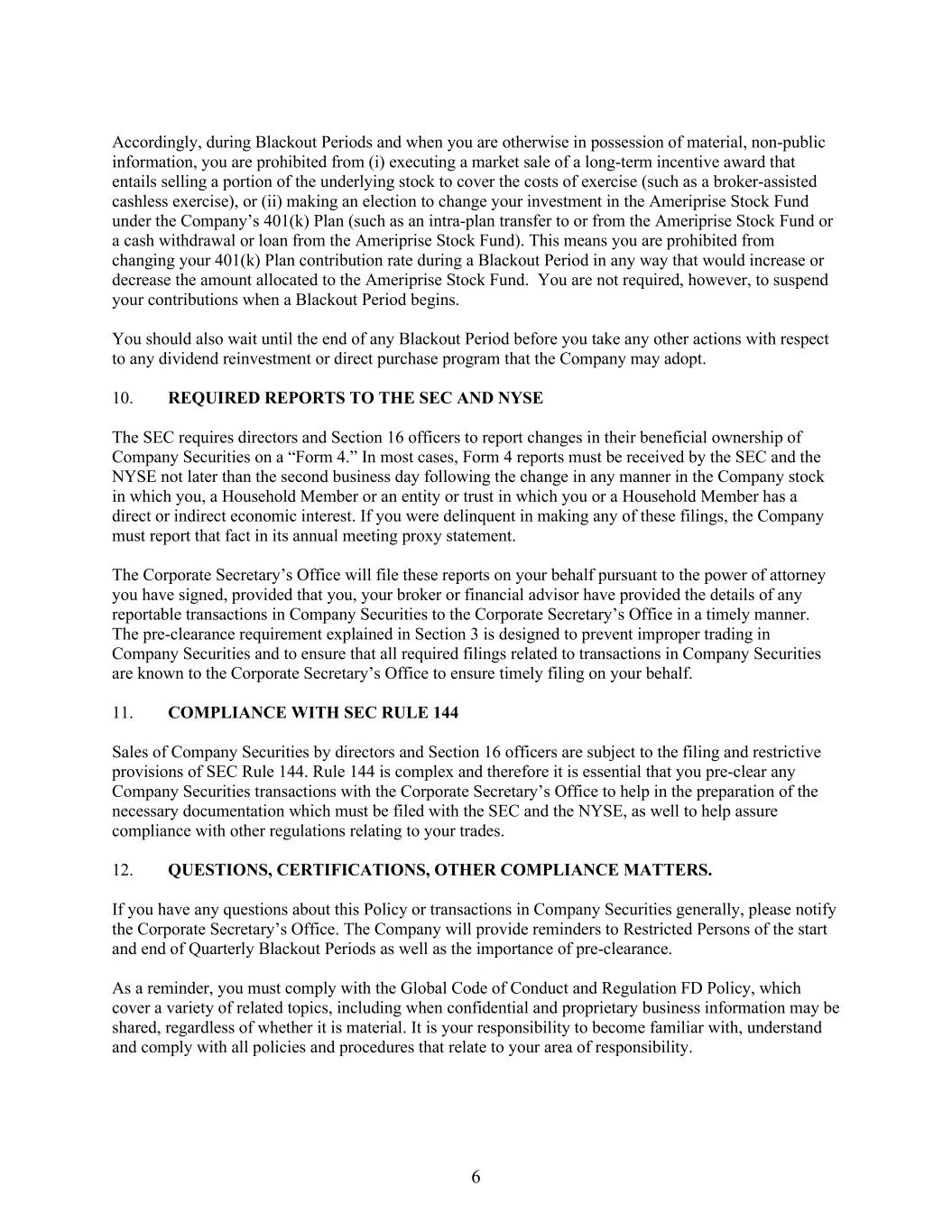
6 Accordingly, during Blackout Periods and when you are otherwise in possession of material, non-public information, you are prohibited from (i) executing a market sale of a long-term incentive award that entails selling a portion of the underlying stock to cover the costs of exercise (such as a broker-assisted cashless exercise), or (ii) making an election to change your investment in the Ameriprise Stock Fund under the Company’s 401(k) Plan (such as an intra-plan transfer to or from the Ameriprise Stock Fund or a cash withdrawal or loan from the Ameriprise Stock Fund). This means you are prohibited from changing your 401(k) Plan contribution rate during a Blackout Period in any way that would increase or decrease the amount allocated to the Ameriprise Stock Fund. You are not required, however, to suspend your contributions when a Blackout Period begins. You should also wait until the end of any Blackout Period before you take any other actions with respect to any dividend reinvestment or direct purchase program that the Company may adopt. 10. REQUIRED REPORTS TO THE SEC AND NYSE The SEC requires directors and Section 16 officers to report changes in their beneficial ownership of Company Securities on a “Form 4.” In most cases, Form 4 reports must be received by the SEC and the NYSE not later than the second business day following the change in any manner in the Company stock in which you, a Household Member or an entity or trust in which you or a Household Member has a direct or indirect economic interest. If you were delinquent in making any of these filings, the Company must report that fact in its annual meeting proxy statement. The Corporate Secretary’s Office will file these reports on your behalf pursuant to the power of attorney you have signed, provided that you, your broker or financial advisor have provided the details of any reportable transactions in Company Securities to the Corporate Secretary’s Office in a timely manner. The pre-clearance requirement explained in Section 3 is designed to prevent improper trading in Company Securities and to ensure that all required filings related to transactions in Company Securities are known to the Corporate Secretary’s Office to ensure timely filing on your behalf. 11. COMPLIANCE WITH SEC RULE 144 Sales of Company Securities by directors and Section 16 officers are subject to the filing and restrictive provisions of SEC Rule 144. Rule 144 is complex and therefore it is essential that you pre-clear any Company Securities transactions with the Corporate Secretary’s Office to help in the preparation of the necessary documentation which must be filed with the SEC and the NYSE, as well to help assure compliance with other regulations relating to your trades. 12. QUESTIONS, CERTIFICATIONS, OTHER COMPLIANCE MATTERS. If you have any questions about this Policy or transactions in Company Securities generally, please notify the Corporate Secretary’s Office. The Company will provide reminders to Restricted Persons of the start and end of Quarterly Blackout Periods as well as the importance of pre-clearance. As a reminder, you must comply with the Global Code of Conduct and Regulation FD Policy, which cover a variety of related topics, including when confidential and proprietary business information may be shared, regardless of whether it is material. It is your responsibility to become familiar with, understand and comply with all policies and procedures that relate to your area of responsibility.

7 You are responsibility for annually certifying your understanding of and intent to comply with this Policy, which may happen through an electronic acknowledgment and in connection with other compliance matters and policies.






